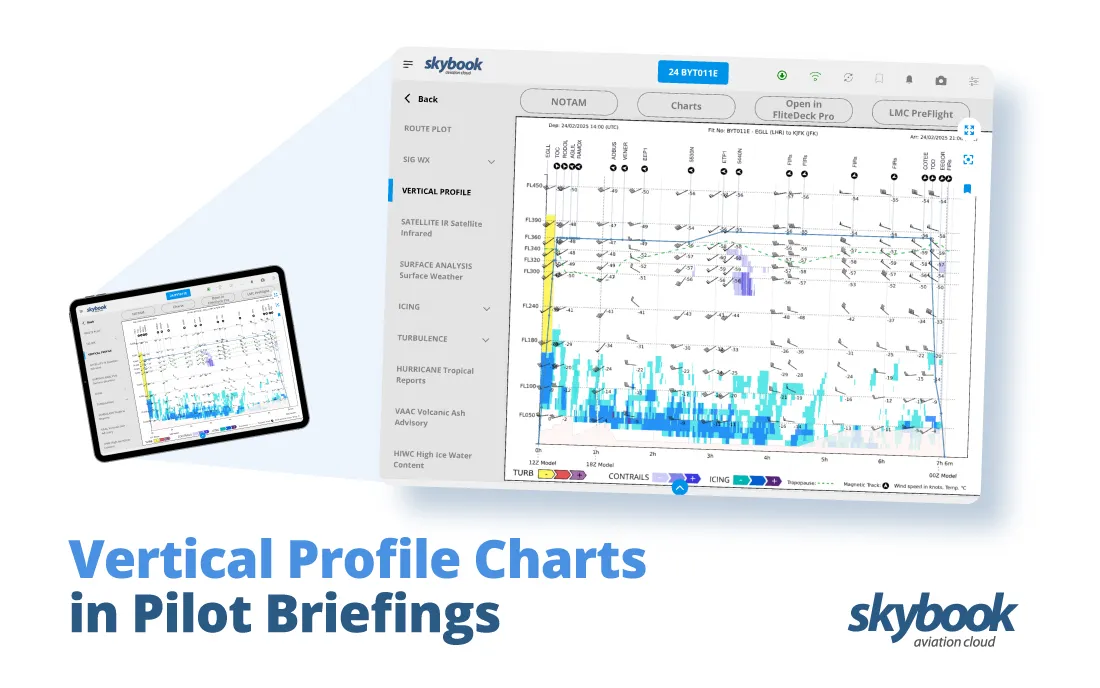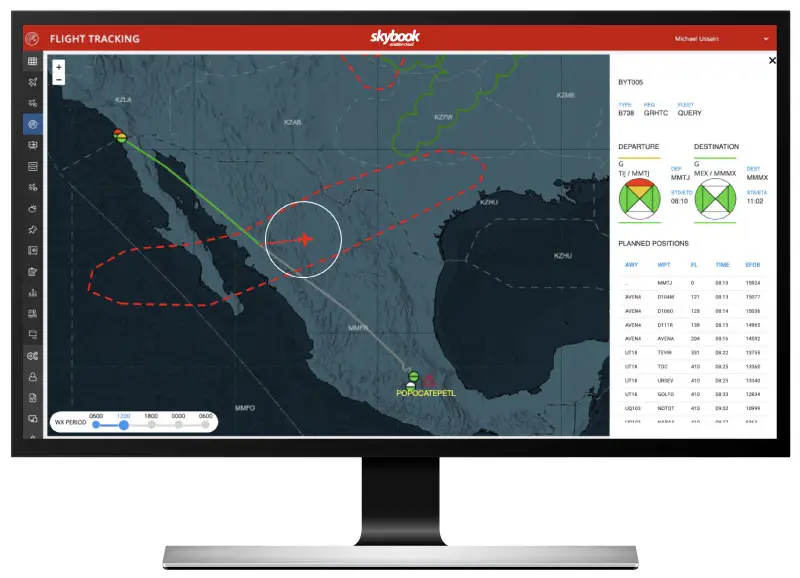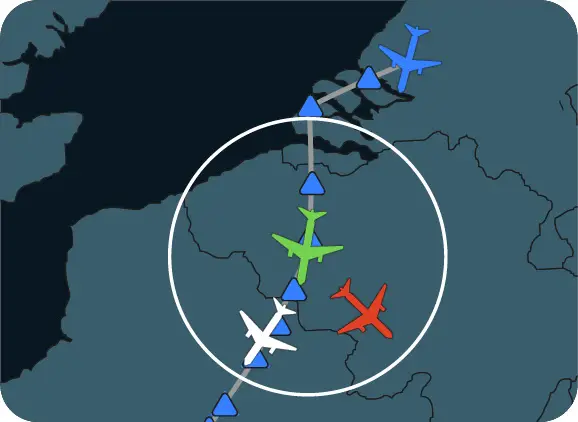
Vertical Profile Charts in Pilot Briefings
Airlines are seeing a fast-growing need for the implementation of having effective, near real-time flight tracking software.
Ever since the Malaysia airlines MH370 disappearance in 2014 and the Air France 447 crash in 2009 (due to the lack of radar coverage over oceans), real-time flight tracking has seen a huge demand for all commercial airline operators.
Unlike other providers, skybook prioritises GADSS compliance specifically for airlines. This means that along with actual position tracking, users also see planned positions taken directly from the flight plan.
More importantly this includes aircraft deviated positions and alerts, informing operators if an aircraft has veered too much from its flight path.
Your specific flights are also displayed as on the ground 15 minutes pre-flight and post-flight. The flight tracking data can also be accessed post-flight within the flight data storage.
Using the latest satellite technology, skybook flight tracking is able to integrate with ADS-B data to ensure that flight operators have the quickest and most visible aircraft position updates available.
![]()
By choosing to integrate ADS-B within flight tracking, skybook is able to show aircraft position updates roughly every 7 seconds! Now compare this to ADS-C, in which air traffic controllers request automated status updates from an aircraft’s flight management computer, which would send usually between 10 to 14 minutes.
Aireon the innovators of ADS-B air traffic surveillance, recommend that an aircraft in a distress situation needs to be tracked at least once per minute.
GADSS compliance means flight tracking systems have to receive aircraft position updates at least every 15 minutes and once per minute or less, in a distress situation. By utilising ADS-B and ACARS, skybook can effortlessly report position updates well within the compulsory 15 minutes.
![]()
ACARS allows airplanes to communicate with the ground team via satellite and VHF radio. This can be structured messages, allowing pilots to send requests. It is the underlying, long-range communication mainly for larger aircraft. Whereas ADS-B is short-range and requires aircraft to have an onboard GPS, used to track the aircraft’s position.
It has become a mandated requirement by the FAA that every aircraft must be equipped with ADS-B since 2020 in case an aircraft is in distress; as ADS-B is proven to be much more accurate.
Airlines can easily track specific aircraft within skybook, by using filters such as flight number, aircraft type or plane registration. Flight followers can see the aircrafts airways and waypoint navigation data, flight level and estimated fuel on board (EFOB).
A flight level key also helps visualise what height in feet an aircraft is currently at, whilst the planned flight layer, allows operators to see the difference in actual flight vs projected flight.
![]()
If a plane deviates from its planned flight path, alerts are sent and displayed distinctly within the flight tracking system.
Flight dispatchers also receive instant notifications on the dispatch monitor within the skybook aviation software. Meaning the airline is aware of issues straight away and emergencies can be dealt with much sooner and escalated if needed.

The ground crew can also spot other issues much sooner. By utilising the flight level controls and the planned position data, dispatchers can see if an aircraft is entering a descent or ascent that is not scheduled on the operational flight plan data.
Improved situational awareness of this means they can communicate quicker to the flight crew and prepare for any potential issues the pilot may have come across.
Dealing with constant changes in weather and NOTAM information can be a real pain for flight crew. An aircraft’s on-time performance can be hugely affected depending on the weather situation.
Noticing changes in weather such as the wind speed and air temperature could be detrimental to the flight. Especially when they may need to alter their planned route to avoid weather hazards which could be adverse.
Therefore, it is in the airlines best interest from a monetary and safety aspect, to provide flight operations with a reliable tracking solution. Improving awareness of upcoming weather issues, means flight followers are fully aware of what the pilot might be flying towards and can be better prepared.
![]()
skybook flight tracking features powerful weather and environment layers. Giving airlines the ability to instantly toggle detailed weather visuals such as Upper wind and temperature, clear air turbulence and cumulonimbus clouds.
Along with accessing airfield NOTAM data, flight information regions, North Atlantic Tracks (NATs) data, Graticule and more. Combining the layers with intuitive flight level and weather period controls means flight followers can quickly see the current weather or projected forecast over an aircraft's planned flight path.
![]()
Tracking specific aircraft is also made much easier with aircraft position colour coding.
Blue - On the ground 15 minutes pre-flight and post-flight
White - Planned position from the OFP
Green - Current position of the aircraft
Red - Aircraft deviation from its flight path

All the flight tracking data is stored and can be downloaded to integrate into other systems if required. Flight data is stored in the record vault, which provides free data for 90 days, or up to 5 years.
This allows for historical flight data to be retrieved if there was ever a critical incident that needed reviewing.
Find out more about the skybook flight tracking system or leave a message below to request a free demonstration.
This article may also interest you: What is Flight Watch?
Get access to our latest news & skybook updates